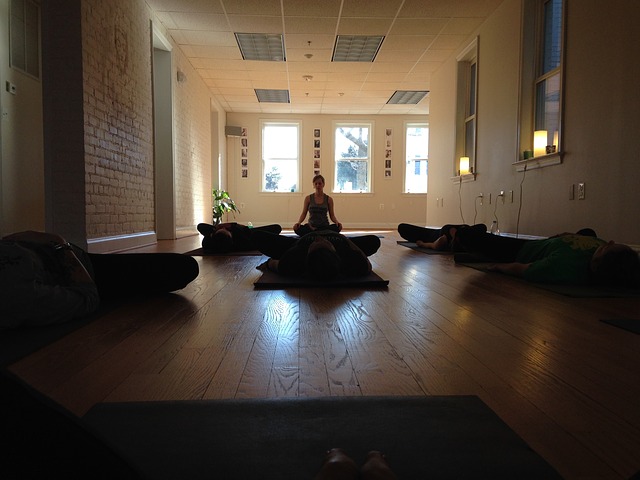 We recently had a question about Ignatian Yoga, which is described as being an integration of Ignatian spirituality and yoga. Is this okay for Catholics?
We recently had a question about Ignatian Yoga, which is described as being an integration of Ignatian spirituality and yoga. Is this okay for Catholics?Of course not. Ignatian Yoga is just another form of so-called Christian yoga. Even though the creators of this yoga claim that by combining Ignatian spirituality with Hindu philosophy participants can “experience God’s presence through movement, personal and communal prayer, and spiritual conversation,” this is just another way of describing an attempt to reconcile or merge opposing philosophies or principles. No matter how artfully it’s described, it’s syncretism.
One of the founders of this program is a young Jesuit priest named Father Robert “Bobby” Karle, who began practicing yoga in 2009 while volunteering in Belize. During his time in Jesuit formation he completed a 500-hour yoga teacher training and received a Master’s degree in Philosophy from Fordham University.
In this video, Father Karle says that he believes Catholics can integrate the Ignatian tradition with yoga, and that the more he engages in these practices “the more points of connection I find”. He believes that the two traditions “have something to share that we can learn a lot from the other…” He claims this new yoga is helping people to find new ways of encountering God…”
Perhaps this is true for someone with a masters in Philosophy, but what about the average Joe in the pew? Will they be able to find “points of connection” or are they more likely to interpret this program as at least a tacit endorsement of the practice of Hinduism? Is this a risk Father Karle – or anyone for that matter – should be willing to take?
As for how Ignatian Yoga is practiced in a retreat format, Fr. Joe Hoover, SJ, writing for the controversial America Magazine, claims there was no attempt to “fabricate some awkward blend of the two spiritualities” but to use it “as a vehicle for calming and centering a person, so he or she is able to receive more fully the Christian spirituality on offer.” There was no use of yoga during Mass or Confession; however, “the asanas were often practiced in the church sanctuary, around the altar. While this is not sacrilegious or heretical or anything, it did feel like a bit much.” He didn’t like the idea of yoga being practice around the altar, but suggested that may be was just being “terrifically rigid.”
Equally disturbing is the way Ignatian Yoga deals with the question of whether or not this program was appropriate for Catholics on its FAQ page. While it gave the predictable answer of “yes” because the founders believe it's important to be educated about both traditions, they offer a list of resources which includes not a single critical source. Instead, they offer the works of pro-yoga Jesuits such as Francis X. Clooney, SJ who teaches at Harvard Divinity School. Fr. Clooney wrote a book entitled, Hindu Wisdom for all God’s Children, which explains what one can learn about God from the Hindu religious tradition by taking a look at various Hindu gods. Even if such a comparison is done from a purely scholarly point-of-view, to introduce this to a general audience, without knowing how well catechized they are, risks not only causing scandal among the faithful who might think it’s okay to embrace Hindu gods, but it also encourages confusion and the embrace of relativism – which is the belief that all religions are equal. To offer not a single opposing opinion about the dangers of mixing Christianity with other faiths, when so much credible material is available, is simply unacceptable. For example, the Vatican document, “A Letter to the Bishops on Some Aspects of Christian Meditation,” provides vital information to the faithful about what could go wrong when blending eastern and western spiritual practices.
It’s also disingenuous to claim that they’re not really mixing the two religions even while making statements such as how there are “points of connection” between the two faiths and that we can “learn from the other.” Mixing the two doesn’t just mean practicing yoga during Mass; it also means using a pagan form of worship to facilitate one’s relationship with God.
The founders of Ignatian yoga as well as other forms of so-called Christian yoga would be wise to read what the Lord has to say about this subject. In the book of Deuteronomy, He instructs the Israelities not to adopt pagan forms of worship, saying explicitly, “You shall not worship the Lord, your God, that way” (12:31). Any practice that even resembled pagan worship was to be avoided.
The book of Hosea devotes the first fifteen verses of Chapter 5 to a similar admonition against this blending of Christianity and paganism. As the commentary states, “This condemnation included the tendency toward a subjective attitude toward religions worship and rituals that denied the existence of one true religion. Such denial of the existence of objective truth tends to lead to the erroneous belief that all religions are equal.”
Thankfully, the Lord doesn't mince words, which is why the wise should pay close attention to what He has to say.
© All Rights Reserved, Living His Life Abundantly®/Women of Grace® http://www.womenofgrace.com
